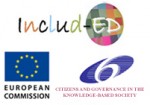The second Advisory Committee meeting for the Includ-ed project took place on the 20th of June 2009 in Barcelona Science Park. People representing the various vulnerable groups who the research is addressed to participated in this meeting: young people, cultural groups, people with disabilities, and women.
In the first part of the meeting the results related to practices which are promoting the improvement of academic performance and social inclusion were presented. Some of the latest contributions from Project 3 were also described, as well as the analysis of the link between education and success in other social areas. One of the aspects which were underlined in relation to this project was the transition from a Dialogic Contract for Educational Inclusion to a Dialogic Contract for Social Inclusion. This transition meant moving from the transformation of a school to the transformation of an area or a neighbourhood. In that sense, the importance of using the critical communicative methodology in order to carry out this process was highlighted, which involves including the whole community. Finally, the way in which public administrations are asking for scientific results which make these area and neighbourhood improvements possible was stressed, as well as the impact this has on vulnerable groups. This situation was discussed during the meeting, and members of the Advisory Committee made proposals. Amongst these proposals, the following ones are underlined:
* It is a priority to pay attention to the opinions of people who actions for improvement are aimed at. The research team should respond responsibly in order to ensure that this process is rigorously carried out.
* Fostering intergenerational participation in neighbourhood committees in order to guarantee extensive and diverse participation in the decision-making process.
* Employing professionals who will become integrated into the daily life in areas or neighbourhoods which are going to transform. If possible they should coexist with the community for a large number of hours.
* Incorporating new technologies as a basic tool in order to include all of the vulnerable groups, underlining the significance of including people with disabilities.
* Creating spaces involving trust which promote the involvement of everyone in the actions which are being carried out through the Dialogic Contract for Social Inclusion.

